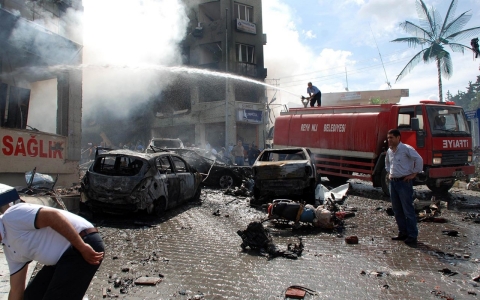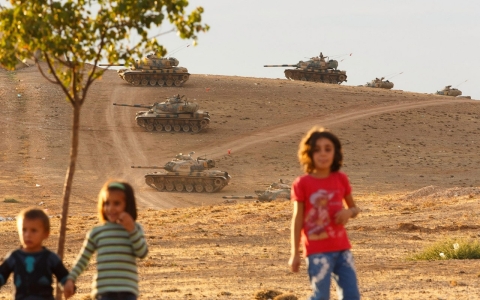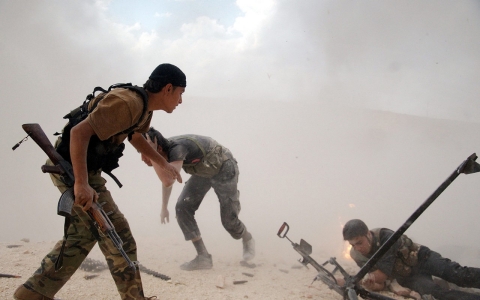Islamic State in Iraq and the Levant (ISIL) fighters launched a renewed assault on the Syrian Kurdish city of Kobane on Wednesday night, and at least 21 people were killed in riots in neighboring Turkey, where Kurds rose up against the government for not acting to protect their brethren across the border.
Heavily outgunned Kurdish defenders said ISIL had pushed into two districts of the mainly Kurdish border city late on Wednesday, despite U.S.-led airstrikes that the Pentagon acknowledged would probably not be enough to safeguard the town.
Washington said its warplanes, along with those of coalition ally the United Arab Emirates, struck nine targets in Syria, including six near Kobane that hit ISIL artillery and armored vehicles. They also struck the group’s positions in Iraq five times.
Nevertheless, Kobane remained under intense bombardment from ISIL emplacements, within sight of Turkish tanks at the nearby frontier that have so far done nothing to help.
"Tonight [ISIL] has entered two districts with heavy weapons, including tanks. Civilians may have died because there are very intense clashes," Asya Abdullah, a co-chair of the Democratic Union Party, the main Kurdish group defending the area, told Reuters from Kobane.
Meanwhile in Turkey, street battles raged between Kurdish protesters and police across the mainly Kurdish southeast, in Istanbul and in Ankara, as fallout from war in Syria and Iraq threatened to unravel the NATO member's delicate Kurdish peace process. The street violence was the worst Turkey has seen in years.
U.S. officials were quoted voicing impatience with the Turks for refusing to join the coalition against ISIL fighters, who have seized wide areas of Syria and Iraq.
The Turkish parliament voted last week to authorize cross-border intervention, but President Recep Tayyip Erdogan says his country would join only if Washington agrees to use force against Syrian President Bashar al-Assad, not just the extremist groups fighting him in the country’s three-year-old civil war. Ankara has raised issue with the fact that U.S.-led airstrikes lack a viable rebel partner on the ground, implying that the regime is likely to benefit if strikes roll back ISIL from its vast holdings in Syria’s north and east.
Erdogan also wants the alliance to enforce a no-fly zone to prevent Assad's air force from flying over Syrian territory near the Turkish border and to create a safe area for an estimated 1.2 million Syrian refugees in Turkey to return.
Turkey's Kurds, who make up the majority in the southeast of the country, say Erdogan is stalling in order to extract concessions from the Syrian Kurds, who he feels have abandoned the rebellion against Assad as they begin to carve out an autonomous region in Syria’s northeast.
In cities across Turkey, police fired tear gas and water cannons to disperse demonstrators, who burned cars and tires. Authorities imposed curfews in at least five provinces, the first time such measures have been used widely since the early 1990s.
Turkish Prime Minister Ahmet Davutoglu told reporters in Ankara that 19 people were killed and 145 wounded in riots across Turkey, vowing that Turkey's peace process with Kurdish separatists would not be derailed by "vandalism." The Dogan news agency later said the death toll had climbed to 21. At least 10 people died in clashes in Diyarbakir, the largest Kurdish city in Turkey's southeast.
Others died in clashes between protesters and police in the eastern provinces of Mus, Siirt and Batman. Thirty people were wounded in Istanbul, including eight police officers.
The unrest in Turkey, which has NATO's second-largest armed forces, exposes the difficulty Washington has faced in building a coalition to fight ISIL in Syria and Iraq, two countries with complex, multisided civil wars in which every nation in the region has a stake.
U.S. officials, acknowledging it will be hard to shield Kobane from the air, have played down its strategic importance.
"Airstrikes alone are not going to do this. They're not going to fix this. They're not going to save the town of Kobane. We know that," Rear Adm. John Kirby, a Pentagon spokesman, told a news briefing.
Secretary of State John Kerry added, "As horrific as it is to watch in real time what is happening in Kobane … you have to step back and understand the strategic objective." He was lukewarm on Turkey’s request for a no-fly zone, saying only that it was an idea "worth examining."
France said it supported the idea of a safe area, and Britain said it was studying it. But it is clear the proposal has not taken hold in Washington, which has been bombing ISIL targets in Syria without objections from Assad and does not want to be dragged into a conflict against Damascus.
"At the moment, the American air force is flying all over Syria with the permission of the Assad government," said Tim Ripley, a defense expert for Jane's Defense Weekly.
"To try and impose a no-fly zone would potentially involve a major air war against one of the biggest air forces in the Middle East … which would only be a distraction from the fight against [ISIL]," he said.
Kerry said Turkey was still deciding what role it would play. Retired U.S. Gen. John Allen, charged with building a coalition against ISIL after it seized about a third of neighboring Iraq, is due in Turkey this week.
Although it has been taking in Kobane's refugees and treating its wounded, Turkey has deep reservations about deploying its army in Syria. Beyond becoming a target for ISIL, Ankara fears being sucked into Syria's civil war.
It also fears empowering Syria's Kurds, allies of Turkey's Kurdistan Workers' Party (PKK), which has waged a decades-long insurgency for Kurdish autonomy, in which about 40,000 people have been killed.
The PKK's jailed leader, Abdullah Ocalan, has said any massacre of Kurds in Kobane would doom a fragile peace process with Turkish authorities — one of the most important initiatives of Erdogan's decade in power.
The street protests across Turkey were already making the prospect of reconciliation with nationalists seem more remote, as protesters set fire to Turkish flags and attacked statues of the founder of modern Turkey, Mustafa Kemal Ataturk.
Al Jazeera and Reuters

Under pressure to take more active stance in coalition, Ankara is mindful of potential backlash from border extremists

Under pressure to take more active stance in coalition, Ankara is mindful of potential backlash from border extremists

Analysis: The US will struggle to find a proxy that shares its priorities and offers a credible challenge to ISIL






Error
Sorry, your comment was not saved due to a technical problem. Please try again later or using a different browser.